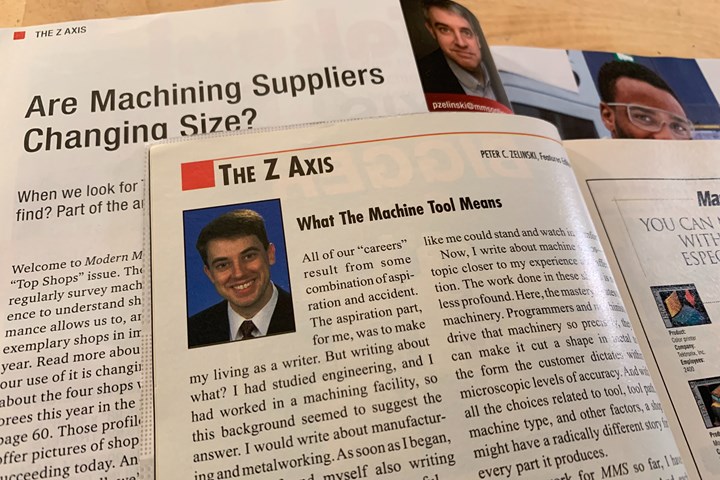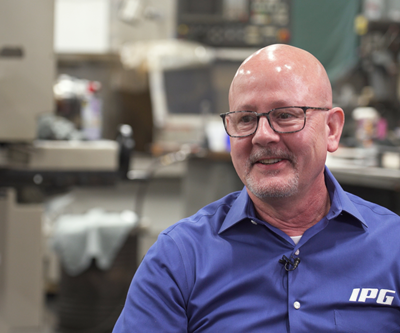20 Years of “The Z Axis”
Peter Zelinski notes the 20-year anniversary of his monthly column for Modern Machine Shop, offering reflections on writing this column for machining leaders and professionals over the span of two decades.
Share





I have been writing “The Z Axis,” my monthly column that appears in Modern Machine Shop magazine, for 20 years now.
In fact, longer. I am a little late acknowledging this anniversary, which came in July, because there was always something more pressing to write about than my own personal milestone. That tension reflects my changing sense of what the column should cover — more on that in a bit.

“The Z Axis” first appeared in the July 2000 issue of Modern Machine Shop, seen here. (Underneath it is an issue from 2020.)
As a writer, I have never stopped being grateful that I have this platform, this monthly chance and challenge to say something out of my own reflection that might be worth the reader’s pausing to take it in. Mark Albert preceded me as editor-in-chief of MMS, and when he semi-retired, he cited the monthly demand to come up with an idea for his column as one of the pressures he’d be relieved to be done with. I understood what he was saying, but I do not experience the challenge of the column the same way. The ideas are there, but there is an exercise of peripheral vision in spotting them from unexpected directions, of patience in allowing them to come more fully into view, of permission in accepting that the idea at hand, incomplete though it seems, is enough. Getting ideas is not hunting; it is bird watching.
So if you’ll indulge me, what follows are a few observations related to writing “The Z Axis” for this long. When I sit with the anniversary and reflect upon it, here are the birds that come into view:
1. I gave about 5 seconds of thought to the name of the column. It was obvious: I have a “Z” last name and nearly every machine tool has a Z axis. Those 5 seconds have defined my branding for two decades. People who can’t remember my name will call, “Z Axis!” The lessons I take from this are (1) branding is powerful, particularly if it is simple and memorable, and (2) beware of second-guessing. Sometimes the obvious choice is best.
2. The role of a monthly column has changed. It used to be special and valuable just to have a platform from which to express a point of view to an audience. Today, most anyone can have this. A well-written LinkedIn or Facebook post might inform or move people. Since having a platform is no longer a distinction, it is more important than ever that I use the platform well.
My colleague Matt Danford sensed this. When he was offered a monthly column, he did not want it to be a personal platform at all, though this would depart from the entire precedent of MMS staff columns. To assure he always used his platform well, he insisted on covering a beat, dedicating his column to a topic. The result is “Data Matters,” his column on the advance of digital technology for manufacturing.
3. I once read about a television writer from the 1960s and ’70s who said that, during this time, the mark of a high-caliber TV show was to have 1/3 of the episodes be excellent, 1/3 of them pleasantly watchable and only the remaining 1/3 poor to embarrassing. The volume of TV production was so great that a level of quality above this was unattainable. I have taken reassurance in this as I’ve looked back on my columns, feeling okay with the work if I could maintain something like the same proportions.
I’ve gotten better. I have learned that an embarrassing column is liable to result if I am grinding an axe that needs to be sharpened just in that moment, if I am caught up in the motion of a political tribe, or if I think I am being clever. Today, if any of those things starts to happen, a red flag goes up and I don’t even write that column.
4. National and international events find their way in. With major tragedies, there comes a point where I throw up my hands. I give up on reacting to it the way I think I am supposed to, and instead I just offer the incomplete truth as best as I am seeing it. That happened post-9/11, during the Great Recession and in the time of covid — three of my columns that have elicited the most response from readers.
Z-Axis Columns Mentioned in This Post
What the Machine Tool Means (2000)
Safeguarding Joy (2001)
Random Thoughts About This Whole Big Thing We’re Going Through (2009)
Has COVID-19 Made a Case for Automation? Taught Us About People Instead (2020)
Die Makers Adapt to Challenges All Machine Shops Face (2020)
Hope Is an Asset: Here Are Machine Shops Following Clear Visions for the Future (2020)
Machining Suppliers of the Future Will Be Both Bigger and Smaller (2020)
That post-9/11 column is the one that made the most impact. This was before social media, so writing that took the form of personal connection to big events was not as pervasive. I mentioned my first daughter in that column, who had just been born, and over a year later I was still hearing from readers who noted this detail. She is doing fine, by the way, but timing still gives shape to her life. Interesting fact: If you are born just before a major terrorist attack, then you get to start college just before a global pandemic.
5. The name of my column is arguably a poor fit for the column now. That name refers to me, but the column should be less about just my viewpoint now. Mark Albert’s departure moved my column to the lead position, so my piece is now the front door to the issue. This leads me to something like the conclusion Matt Danford came to, except that my beat is the magazine — the theme and contents of the issue the editorial team is presenting that month. That is why I am late in telling you about this anniversary. MMS produced issues on automation, on die making, on hope and on Top Shops, and I wanted to use my column to showcase each of those themes instead.
I’ll keep the name, of course. It is such good branding that I couldn’t shake it. But I will use this column more and more to talk about not just my ideas, but ours — what the MMS writers are discovering, what themes and topics they are exploring. That is, going forward, I’ll often use this platform as a stepping stone into the issue, and I hope readers will come to understand, however strange it may seem, that in Modern Machine Shop, the Z will mark the beginning.
Read Next
Hope Is an Asset: Here Are Machine Shops Following Clear Visions for the Future
A simple strategy offering a clear aim to hope for is particularly valuable during a disruptive time. Recently posted articles offer examples of shops following clear ideas for the way ahead.
Read More





















.jpg;maxWidth=300;quality=90)


